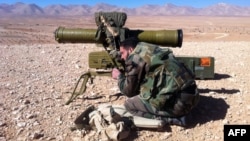GENEVA —
A new investigative report into the Syrian conflict accuses all armed groups of war crimes and crimes against humanity.
Based on research and more than 500 interviews conducted between July and January, the report, released Wednesday by the independent international Commission of Inquiry on the Syrian Arab Republic, sees no end in sight to the three-year-old war, nor an end to massacres and brutal human rights violations committed by all armed parties to the conflict.
According to the recently published findings, the war has claimed more than 130,000 lives and created nine million refugees and internally displaced people. The U.N. investigators, who have just returned from refugee camps in neighboring countries of asylum, say many of the victims feel abandoned and without hope.
The commission chairman, Brazilian legal scholar Paulo Pinheiro, says the latest report documents widespread attacks and sieges on civilian areas in Syria by pro-government forces leading to mass casualties, malnutrition and starvation.
As in the past, the Syrian government has denied the investigators access to the country.
“One of the most stark trends we have documented is the use of siege warfare," Pinheiro said. "The denial of humanitarian food and basic necessities, such as medical care and clean water, has forced people to choose between surrender and starvation. In this report we document how government forces and pro-government militias continue to conduct widespread attacks on civilians, systematically committing murder, torture, rape and enforced disappearances as crimes against humanity.”
The report also identifies rebel groups in Al-Raqqah whom, the U.N. reports for the first time, it accuses of widespread detentions and systematic torture of prisoners, amounting to crimes against humanity. It also accuses pro-government and non-state armed groups of massacres.
Pinheiro says all warring parties are committing atrocities with total impunity, and that all parties disrespect the rules of engagement and do not fear being held accountable for their acts.
“The Security Council bears responsibility for not addressing accountability and allowing the warring parties to violate these rules with total impunity," he said. "Member states that are supporting parties, both parties, into one and the other, they can be held responsible for the breeches of international humanitarian law by the forces that are being supported.”
Pinheiro does not name any specific country, but Russia, a staunch ally of the regime of Syrian President Bashar al-Assad, has vetoed a number of Security Council resolutions to condemn the war and ease access by humanitarian agencies to the victims.
Only the Security Council can refer the situation in Syria to the International Criminal Court. Chairman Pinheiro says the Commission has drawn up a secret list of perpetrators and has established a data bank of all crimes and violations that will be available to the ICC for any future prosecution.
Based on research and more than 500 interviews conducted between July and January, the report, released Wednesday by the independent international Commission of Inquiry on the Syrian Arab Republic, sees no end in sight to the three-year-old war, nor an end to massacres and brutal human rights violations committed by all armed parties to the conflict.
According to the recently published findings, the war has claimed more than 130,000 lives and created nine million refugees and internally displaced people. The U.N. investigators, who have just returned from refugee camps in neighboring countries of asylum, say many of the victims feel abandoned and without hope.
The commission chairman, Brazilian legal scholar Paulo Pinheiro, says the latest report documents widespread attacks and sieges on civilian areas in Syria by pro-government forces leading to mass casualties, malnutrition and starvation.
As in the past, the Syrian government has denied the investigators access to the country.
“One of the most stark trends we have documented is the use of siege warfare," Pinheiro said. "The denial of humanitarian food and basic necessities, such as medical care and clean water, has forced people to choose between surrender and starvation. In this report we document how government forces and pro-government militias continue to conduct widespread attacks on civilians, systematically committing murder, torture, rape and enforced disappearances as crimes against humanity.”
The report also identifies rebel groups in Al-Raqqah whom, the U.N. reports for the first time, it accuses of widespread detentions and systematic torture of prisoners, amounting to crimes against humanity. It also accuses pro-government and non-state armed groups of massacres.
Pinheiro says all warring parties are committing atrocities with total impunity, and that all parties disrespect the rules of engagement and do not fear being held accountable for their acts.
“The Security Council bears responsibility for not addressing accountability and allowing the warring parties to violate these rules with total impunity," he said. "Member states that are supporting parties, both parties, into one and the other, they can be held responsible for the breeches of international humanitarian law by the forces that are being supported.”
Pinheiro does not name any specific country, but Russia, a staunch ally of the regime of Syrian President Bashar al-Assad, has vetoed a number of Security Council resolutions to condemn the war and ease access by humanitarian agencies to the victims.
Only the Security Council can refer the situation in Syria to the International Criminal Court. Chairman Pinheiro says the Commission has drawn up a secret list of perpetrators and has established a data bank of all crimes and violations that will be available to the ICC for any future prosecution.




